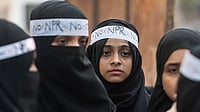Teens, middle-aged women, housewives and even female senior citizens are the new tier in the multi-billion narcotics drug business in Mumbai and its surrounding sub-urbs. While some are coerced into the trade, many women are willfully getting their hands dirty in the narcotics drug business. There has been a leap in their population since the beginning of Covid-19 lockdowns in 2020.
While it was earlier considered to be a business where the majority women participants were the unlettered or those with little education from the lower strata, police investigations have revealed that the upper educated class of women too are “very present” in the trade.
Seven years after the name of the alleged notorious drug queen Shashikala alias Baby Patankar became a common name in police stations across Mumbai, the number of women drug peddlers walking in her footsteps have seen an increase. Arrested in 2015 for allegedly smuggling 122 kilograms of mephedrone, MD or Meow Meow as it is commonly known, Patankar had scripted a spectacular growth in the narcotics trade in a short span of time to emerge as one of the biggest dealers of Meow Meow in Maharashtra. Today, seven years later, the narcotics drug business is attracting women like never before and they are aggressive sellers of the contraband.
According to a source in the Anti-Narcotics Cell of the Mumbai Police, the participation of women in this trade has significantly increased. The increasing and regular arrests of women drug peddlers have made the Anti-Narcotics Cell relook at the role and involvement of women in this illegal business.
“Women are not bystanders any more. They are not small drug peddlers. They are taking over the businesses of their husbands and fathers and are as ruthless as their male counterparts,” said the source to Outlook.
The source —who is investigating some recent arrests— says that men prefer their wives or sisters to take over the drug business as it is easy for them to escape the clutches of law. There is a strict procedure in place to arrest women. Women can only be arrested after sunrise or before sunset. If this is not adhered to, the arrest is considered to be illegal. According to the provisions of the Narcotics Drugs and Psychotropic Substances (NDPS) Act, only a female cop can search a woman suspect. The provisions make arrests of woman culprits difficult.
In the case of Patankar, the Police were unable to arrest her in the neighbourhood she worked in as she would strip to the last garment when confronted by a police squad. Similar is the case with the present-day women peddlers. They strip when the police approach them and scream loudly attracting the attention of the locals. There have been instances of the women suspects stripping during police raids. The police are often attacked by the locals and have to beat a hasty retreat.
“Majority of the women cops are unwilling to participate in raids on drug peddlers due to the dangers it holds. When the women cops go to the places where there is rampant drug peddling by women, the lewd remarks and gestures made at them often frighten them away. They are then unwilling to police in such an area. We cannot blame them as there have been so many instances of police personnel being attacked by peddlers,” said the source.
In 2018, the Anti-Narcotics Bureau’s Azad Maidan unit had arrested two women, Reshma Khan (then 25) and Nasrin Shaikh, for smuggling 75,000 tablets of a synthetic drug called Button. Khan had taken over the business from her father Muzahim. This revealed the pattern of narcotics drug businesses being handed over to wives or sisters to run them.
Another peddler Rani Barsaiya has been arrested and charged multiple times under the NDPS Act. However, far from arrests making a difference, Barsaiya is now firmly entrenched in the trade, said the source.
“She openly sells drugs at Worli Seaface and other areas close by. She has absolutely no remorse,” said a policeman who has been following her “progress” in the drug trade. Interestingly, many female drug peddlers operate in the late evenings after sunset and work into the night. Often, said a policeman, it is difficult to spot a female drug peddler.
In April, a 52-year-old woman and her 67-year-old male accomplice were arrested from Mankhurd in the eastern suburbs of Mumbai with 1.9 kgs of heroin worth Rs 5.8 crore in the international market. The drug was concealed in two water bottles.
In August, during a raid at a narcotics drug manufacturing unit in Nalasopara in Palghar district, close to Mumbai, 700 kilograms of Meow Meow worth Rs 1,400 crore in the international market was seized by the Mumbai Police. The peddlers selling from this include women too, said sources.
The investigations of the police have revealed that many of the female drug peddlers operate in the vicinity of colleges in Mumbai city as well as the sub-urbs. According to a DRI source, many women in the trade are part of a larger syndicate and are given a certain amount of contraband to sell. Depending on the quickness of the sale, the area the sale has been made, and the profit from the sale are the parameters for higher quantities of drugs being pushed to women peddlers.
As party hotspots in Mumbai and its neighbouring Alibaug gear up for the party season, the police confess that female drug peddlers are their biggest worry.


























